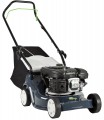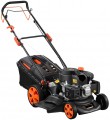Cutting width
The capture width provided by the unit, in other words, the width of the strip of land cultivated in one pass. In fact, this size corresponds to the width of the working nozzle.
The large working width is useful when processing large open spaces, as it allows you to finish the job in a small number of passes. On the other hand, for hard-to-reach places, relatively narrow tools are better suited, able to go where a wider unit will not fit. In addition, the width of the tool directly affects the weight and price.
In general, it makes sense to compare in terms of working width only units of the same type (see above). However, it is worth noting here that trimmers do not differ so much from each other — most models capture from 25 to 45 cm (and a wide processing band is provided by moving the nozzle from side to side). As for the other types, in the most modest models the capture width
does not exceed 40 cm, in the heaviest and most powerful it can be
56 – 60 cm or even
more(in mini tractors — up to 1.5 m).
Mulching
Possibility of work of a lawn-mower in the mode of a mulching.
Mulching is the chopping and automatic spreading of mowed grass over the site. This is one of the most convenient and at the same time practical methods of vegetation disposal. So, it does not need to be collected, and the resulting coating (mulch) performs a number of useful functions: it fertilizes the soil, reduces its heating and evaporation of moisture in hot weather, and also keeps the top layer loose.
Note that some lawn mowers allow you to use a nozzle purchased separately for mulching. However, such models are not included in this category: mulching in our catalog is indicated only for models that support this function out of the box.
Grass ejection
Direction of ejection of grass cut by the lawnmower.
The main options for the direction of ejection are back or sideways; there are also models in which you can choose the direction. At the same time, we note that in classic units, the ejection back is almost always carried out
into the bag(up to the point that when the bag is removed, the hole is automatically covered with a lid), but when the bag is ejected from the
side, it may not be — this is convenient, for example, when mulching ( see above).
Also note that riders (see "Type") have their own specifics: in units with rear discharge, after removing the bag, it is necessary to install a special plug, and then the cut grass will simply remain under the deck. In some
mini-tractors, a similar way of working (without a bag) is provided initially; it is also considered a rear ejection, although the grass does not flow backwards, but downwards.
Bag type
A type of bag used in a lawn mower to collect grass clippings.
—
Hard. Bags (containers) made of a hard material, usually plastic. Such a container is more convenient to unload than a soft one, it is more durable and reliable, but it weighs a little more.
—
Soft. The advantages of soft fabric bags are primarily low weight and the ability to fold after hours, which can facilitate storage. In addition, the degree of fullness of such a bag can be controlled by eye without any special indicators. On the other hand, soft bags are very inconvenient to unload.
—
Combined. Bags that combine soft and hard materials in construction; the upper part is usually made solid. This combination makes it easier to unload the bag and at the same time allows it to be rolled up quite compactly for storage.
— Is absent. The absence of a bag is characteristic of some varieties of mowing units — in particular, mowers and trimmers (see "Type"). In classic lawn mowers, it usually means that this model does not involve collecting grass — all cut vegetation remains on the ground. At the same time, most of these models have the function of mulching (see above), however, there are exceptions.
Bag volume
The volume of the grass clipping bag supplied with the lawn mower. Manufacturers select this volume depending on the power, performance and overall level of the unit, however, similar models may differ in this indicator. In such cases, it is worth considering that a larger bag takes longer to fill and needs to be unloaded less often, but it weighs more and takes up more space (even when empty). Mostly the difference in the volume of the bag is 5 liters and there are
lawn mowers for 35,
40,
45,
50, 55,
60,
65,
70 and more liters.
Motor model
Model of the engine installed in the lawn mower. The main performance data of the engine is usually indicated in the general data for the unit. However, knowing the exact name of the motor, you can find more detailed information on it — from specific data to reviews and reviews. Also, data on the engine model can be useful when searching for spare parts or consumables.
Engine size
The size of the engine installed in the petrol or diesel model (see "Engine type"). Power directly depends on this indicator, however, only engines of the same type can be compared by volume (see "Type of internal combustion engine"). And even in the same type of units of the same power, the volume can be different. In such cases, note that a larger volume means more fuel consumption, but the engine itself may cost less than a smaller one.
Motor power
Lawnmower engine power expressed in horsepower. The common unit of power these days is the watt, but gasoline and diesel engines (see "Engine Type") are traditionally referred to as hp. Some units are easy to convert to others: 1 hp. approximately equal to 735 watts.
In general, the more powerful the engine, the more performant the mower is and the better it handles with heavy work such as cutting thick grass, bushes, etc. On the other hand, high power has a corresponding effect on fuel consumption, as well as the weight and price of the engine. In addition, it should be taken into account that different types of mowers (see "Type") differ in terms of power requirements. For example, among trimmers there are many models with a capacity of
0.7 – 1.3 hp., for gasoline lawn mowers, the minimum power is already in the range of
1.3 – 2 hp., and for
mowers,
at least 2.5 hp is required. . So you can only compare units of the same type in terms of power. Detailed recommendations for choosing a mower depending on its type and features of the planned work can be found in special sources.
Motor power
Lawnmower engine power expressed in watts. This designation is used absolutely for all electric models (see "Engine type"), and it is also often found in gasoline and diesel units along with horsepower (these units are clearly related, 1 hp is about 735 watts).
In general, the more powerful the engine, the more performant the mower and the better it will cope with heavy work such as cutting thick grass, bushes, etc. On the other hand, high power has a corresponding effect on fuel / electricity consumption, as well as the weight and price of the engine. In addition, note that the power requirements depend on the type of mower itself and its engine (see above for both). For example, for most
robots, the power
does not exceed 500 W — more, taking into account specialization, is not required, besides, otherwise the devices would turn out to be too bulky and heavy. Trimmers and lawn mowers of similar power are only electric, and the power limit for power tools is
2500 – 3000 W when powered from the mains and
1500 – 2000 W for battery models. But in gasoline tools, the minimum power is about
500 – 1000 W for trimmers and
1000 – 1500 W for mowers; the maximum value can exceed
4 kW.
Detailed recommendations for choosing a lawn mower d
...epending on its type and features of the planned work can be found in special sources.
